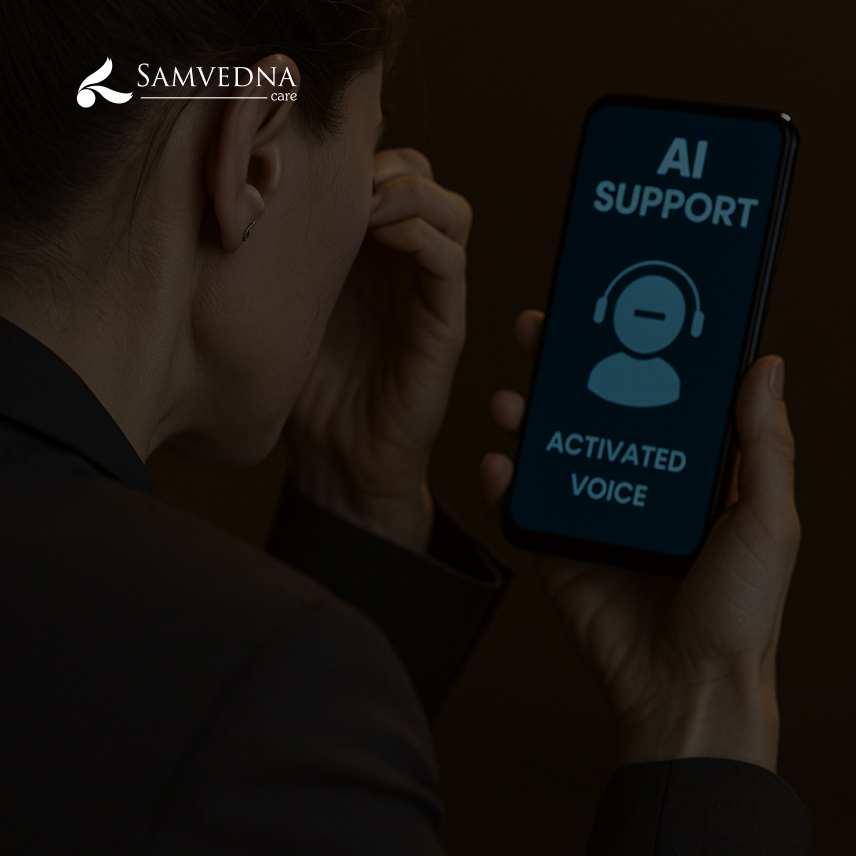Contact Us




For centuries, human beings have turned to one another for healing, whether it was through spiritual guidance, community wisdom, or the structured conversations of modern psychotherapy. The traditional image of therapy is familiar: a quiet room, a compassionate listener, and the slow unraveling of tangled emotions. Yet, in today’s fast-moving, technology-driven world, a new companion has entered the space of emotional care: Artificial Intelligence.
AI-powered chatbots, wellness apps, and virtual assistants are no longer limited to scheduling reminders or answering questions. They now speak to people in their loneliest hours, offering words of comfort, guided exercises, and reflective prompts. For many, the appeal lies in accessibility; support is available at the tap of a screen, without the waitlists, costs, or social stigma that sometimes accompany conventional therapy.
At Samvedna Care, we recognize the role of artificial intelligence in enhancing digital mental health solutions. However, we also understand the sensitive nature of mental health and the ethical challenges surrounding mental health applications of AI.
It often starts small. One night, feeling lonely or a little blue, you ask AI for advice. It responds instantly, listening, validating, and offering gentle words. Soon, these interactions become longer, more ritualistic, and before you know it, you find yourself turning to AI for emotional support regularly. The problem is, it’s not a human being. It doesn’t truly understand your emotions but isolates you making you vulnerable to your relative emotions. While it mimics empathy, it cannot fully grasp the depth of human experience and sometimes, that can be dangerous. And before we realize it, AI becomes a habitual companion, one we trust with our deepest feelings.
Here is where reflection becomes necessary. AI is not human. It does not truly feel. It does not understand the concern behind your sadness, the subtle patterns of your thoughts, or the intricate web of relationships that shape your emotional world. What it offers is an imitation of empathy, a reflection of your own words back to you. Mental health therapists call this the Eliza effect. And though it can feel reassuring, it can also be misleading.
Mental health therapists are raising alarms over the growing use of AI for emotional wellbeing. AI is designed to mirror our words, validating what we say and keeping conversations flowing smoothly. It’s this mirroring that can make us feel understood and comforted, even when understanding is only an illusion. Recent research shows that many teens are turning to AI not just for homework or decision-making, but for emotional support as well. The appeal is clear: AI is available 24/7, anonymous, and affordable. Yet, this constant availability carries a hidden vulnerability. In recent months, there have been heartbreaking cases where young people’s reliance on AI intensified their distress, sometimes even contributing to suicidal thoughts.
So, take a moment and ask yourself: have you found yourself leaning on AI in moments of stress or sadness? Does it feel comforting, or merely convenient? Are we mistaking reflection for understanding, mimicry for empathy?
And yet, the picture is not entirely bleak. At Samvedna Care, we recognize that AI can serve as a support, especially for those living in remote areas, for individuals facing stigma around mental health, or for those unable to access conventional therapy. Many users report feeling heard, validated, and understood. But it is important to reflect on the nature of this support: while AI can mirror our emotions and provide a sense of comfort, it does not replace the depth of human connection or the nuanced guidance of a trained mental health therapist. Awareness of this distinction is key to using AI safely embracing its benefits without allowing reliance on it to inadvertently deepen vulnerability.
AI can be a valuable supplementary tool when used responsibly. It is most effective when integrated into a broader mental health strategy that includes professional therapy, support from friends and family, and self-care practices. AI can assist in early detection of mood changes, promote mental health literacy, and provide accessible coping strategies. However, it should not replace human therapists, especially for individuals with severe or complex mental health conditions.
Mental health therapists are increasingly exploring ways to integrate AI safely. For instance, AI can help monitor progress between sessions, track symptoms, and provide reminders for therapeutic exercises. These uses enhance the therapeutic process rather than replace it. AI as a therapeutic tool represents a fascinating frontier in mental health care, offering accessibility, immediacy, and support for those who might otherwise go without help. However, it is not without limitations and risks. Users must be mindful that AI cannot replicate human empathy, ethical judgment, or the therapeutic alliance essential for lasting mental health outcomes.
Technology is powerful, but so is the human heart. The question is not whether AI will continue to grow, it will but whether we will remember to hold space for each other, to listen, to feel, and to connect in ways no algorithm ever can. That is the timeless work of healing.
Samvedna Care believes mental health is inherently human, requiring connection, understanding, and care that technology alone cannot provide. The ideal approach is a balanced one leveraging AI as a supplement to human therapy, rather than a substitute. By recognizing its limitations and potential risks, we can harness AI responsibly, ensuring it complements, rather than compromises, our mental well-being.